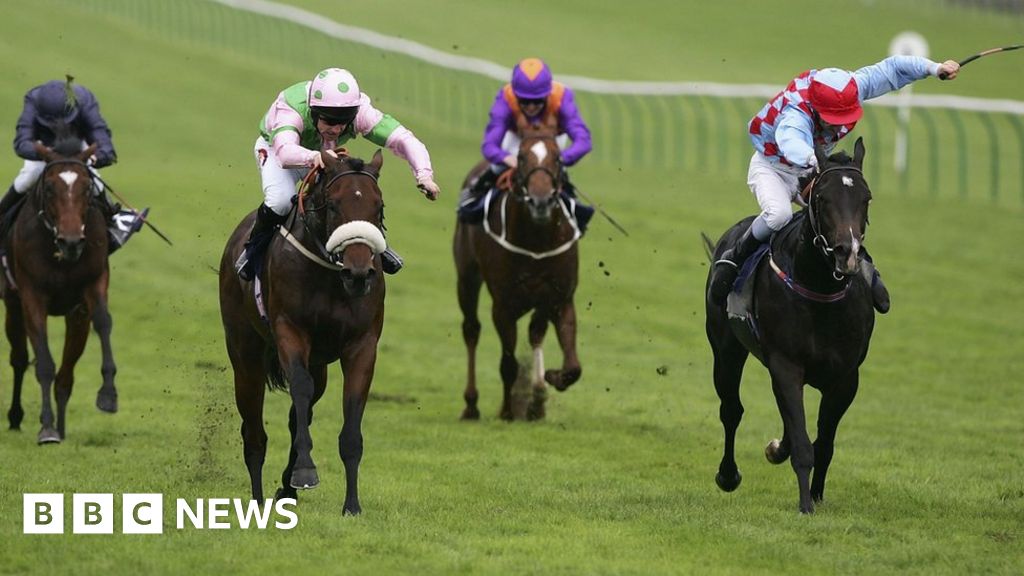- By Vikki Irwin
- BBC Politics East
Image source, Getty Images
Horse racing and breeding in the UK is being hit by rules over exports brought about by the exit from the European Union, industry figures have warned.
The industry is worth £4.1bn annually to the UK economy and supports tens of thousands of jobs.
The British Horseracing Authority has called for red tape, which a Suffolk stud farm said had mired the industry in paperwork, to be cut.
The government said it was looking to improve the export of racehorses.
The number of horses racing in the EU has dropped dramatically since last year, with smaller operators in the industry particularly hard hit, BBC Politics East reports.
Analysis by the British Horseracing Authority found that from January-February 2021, compared to January-February 2020:
- British-trained runners in races in the EU fell by 67%, compared to a 23% reduction in races across the rest of the world
- EU-trained runners in GB races have fallen by 92%, with a 93% reduction in runners from Ireland and 89% from Northern Ireland
- Thoroughbred Export Certificates for permanent export have fallen by 30%, with a larger decrease in February
- Thoroughbred BCNs (Breeding Clearance Notifications for temporary exports) have fallen by 61%
Tom Blain, managing director at Barton Stud of Great Barton, near Bury St Edmunds, Suffolk, said horses had to be conceived naturally to qualify as thoroughbreds.
Since the 1960s an agreement has been in place between Ireland, France and Britain to allow horses to move smoothly between the countries for breeding and racing.
Mr Blain said now the UK had left the EU, the process has changed – and not for the better.
“It’s considerably harder and more complicated to get mares to France or Ireland; that, in turn, means less horses have gone,” he said.
Mr Blain added things had improved since the beginning of the year and you only have “real problems” if all the paperwork is not in order.
Ross Hamilton, of the British Horseracing Authority, gave evidence to a House of Commons committee looking at the movement of animals.
He told MPs that action was needed from the government.
‘Increase in paperwork’
“In terms of quantification of the impacts we have seen, overall, British runners in EU countries are down 51% for the first four months of this year, compared with the equivalent period in 2019, and runners from the EU in Great Britain are down around 40%,” he said.
He said while the Covid pandemic had clearly played a part, “what is clear at the moment is that, at least in the short term, there has been an increase in the paperwork and administration required to move thoroughbreds.”
He told the BBC: “It is important that our industry has the ability to be part of this highly competitive thoroughbred sector.
“It is a concern if there are barriers to that, but we hope that the UK government and the European Commission can achieve improvements to the situation.”
The 55 vets at Newmarket Equine Hospital have seen their workloads increase significantly since January, with horses going for export needing extra health checks.
The paperwork for just one horse to travel overseas requires at least 26 stamps, each needing a vet’s signature, but it could be many more.
James Crowhurst, a consultant vet at the hospital, said: “We knew we would be a third country, subject to new import rules, but we didn’t think they would be so time-consuming and labour-intensive.”
A Department for Environment, Food and Rural Affairs spokesman said: “To ensure movements to EU countries can continue as smoothly as possible, we have implemented a range of initiatives to increase the number of certifiers to meet demand for export health certification.
“We continue to meet regularly with key industry stakeholders, and authorities in France and Ireland, to understand difficulties associated with the movement of equines as they arise.”
Politics East airs on BBC One in the East on Sunday, 20 June at 10:00 BST and can be viewed on the BBC iPlayer afterwards.

